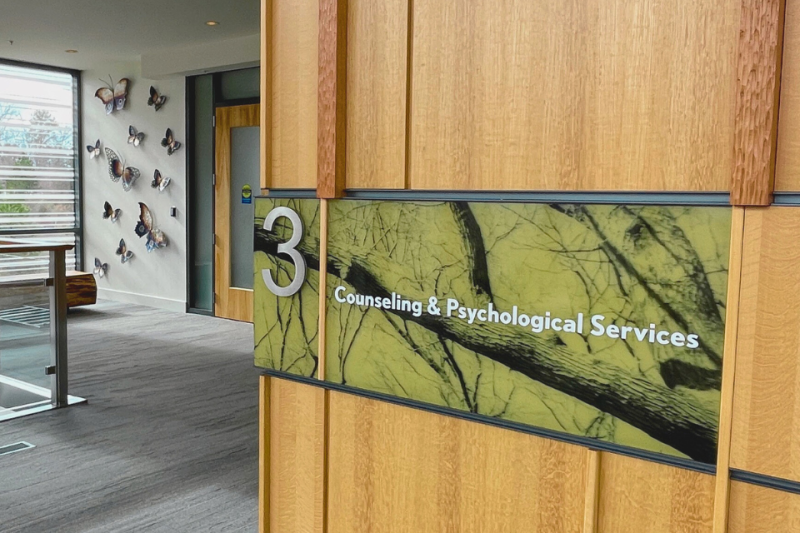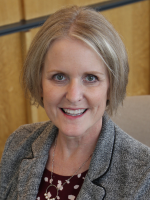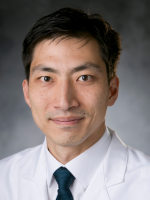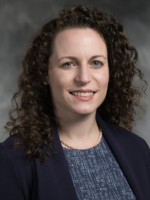
When one undergraduate student came to see Dawn Mason, PMHNP-BC, CPNP-PC, she was struck by how distraught he was. As he struggled to fight back tears, she learned he had performed below his expectations on a recent test. The sense of failure overwhelmed him.
“He didn’t want to call home because he was afraid he was going to upset his mother,” says Mason, a psychiatric nurse practitioner who works primarily at the Duke Children’s Evaluation Center. “He was so down on himself. Every single negative thing he could think about himself—he was thinking it.”
Mason sprang into action both as a mother and a clinician. They talked through his feelings, and she encouraged the student to call his mom. He did, and she came to visit her son. Eventually, the student also started medication to help him handle stress and anxiety.

“At his next appointment, he was doing better and had a big smile on his face,” Mason says. “He’d also talked to an advisor about getting some accommodations, and they put a plan together. Ultimately, he needed someone to assure him that it was all OK.”
Mason was able to help this student through her role in a partnership between Duke University’s Counseling & Psychological Services (CAPS) and the Department of Psychiatry & Behavioral Sciences. The full-time CAPS staff, along with several psychiatrists, psychologists, advanced practice providers, and trainees from Duke Psychiatry, comprise a strong cadre of clinicians who are delivering high-quality counseling and behavioral health services to Duke undergraduate and graduate students. The demand for these services is higher than ever, and they’re making a big difference for students on campus.
The Landscape of Collegiate Mental Health

Mental health difficulties aren’t new on college campuses. Transitioning from high school to the undergraduate years has always been a tumultuous time, says CAPS director Lisa Adams, PhD, LMHC. For most incoming students, Duke presents a more rigorous academic environment than they experienced at their high school. And for many, it’s their first time being away from home, particularly the international students who comprise roughly 20 percent of the undergraduate student body.
As a result, a growing number of students are facing psychological challenges stemming from anxiety.
“We know that anxiety disorders are high, as are related problems like obsessive-compulsive disorder and eating disorders. In addition, they struggle with having the coping skills to just manage with life in general.”
— Lisa Adams, PhD, LMHC
“We know that anxiety disorders are high, as are related problems like obsessive-compulsive disorder and eating disorders,” Adams explains. “In addition, they struggle with having the coping skills to just manage with life in general.”
Social media and helicopter parenting contribute to student anxieties as well, but there’s also been a COVID-19 effect, Adams says. The pandemic robbed these students of the typical teenage experiences, largely delaying their emotional and mental readiness for college life and more independent living.

However, the pandemic did introduce a positive impact, says psychiatrist Jason Cho, MD, an assistant professor in psychiatry and behavioral sciences and CAPS psychiatric services coordinator. It’s made mental health services more accessible.
“COVID affected our college and high school students quite a bit, but it also lowered the stigma around mental health as more people started reaching out for services,” he says. “COVID may have accelerated the trends toward more anxiety that we’re seeing in mental health, but it also opened the door for telehealth, making it easier for people to get the services they need.”
How the CAPS-Duke Psychiatry Partnership Works
The partnership between CAPS and Duke Psychiatry is designed to help students navigate and handle the stresses that come with new academic and social pressures. Through this initiative, Duke hospital-based providers—psychiatrists, psychologists, and advanced practice providers—who specialize in neurodiversity, attention-deficient/hyperactivity disorder, eating disorders, and other conditions, commit a set number of hours each week to providing mental health services to students.
“This program makes counseling and mental health care accessible and familiar. There are often a lot of barriers to students engaging in care in the community. The idea that they would go off campus, use their insurance, and pay co-pays can be really intimidating,” Cho says. “At CAPS, it’s much easier. If they’ve paid their student fees, they have access to our services.”
The CAPS-Duke Psychiatry model is simple. The program doesn’t bill insurance, and there’s no need for an appointment. Students can walk into the clinic between 9 a.m. and 4 p.m., Monday through Friday. During an initial 20- to 45-minute appointment, a triage counselor or social worker will assess their needs and decide which provider or counseling option best suits them.

“These triage therapists are specialists in quick evaluations, and they can determine if it would be appropriate for a student to continue seeing a therapist or to work with a medication provider,” says psychologist Chantal Gil, PsyD, an assistant professor in psychiatry and behavioral sciences. “They’re the first line of defense for CAPS. They’re very thoughtful about where they place students for care.”
Once students receive a recommended care path, there is no limit on their number of therapy sessions. Students can benefit from individual counseling or group sessions on topics such as therapeutic animal assistance, LGBTQIA+, mindfulness, religious trauma, and gender-based discrimination. If students need more extensive help, CAPS coordinators help connect them with a mental health provider in the community.
The Partnership’s Impact
Although CAPS is designed to meet students’ mental health needs, the program positively impacts everyone involved.
According to Adams, having access to specially trained psychologists and psychiatrists frequently leads to rapid improvement for many students.
“Our students tell us they feel good about our services—that we respect them and value their identities,” she says. “Plus, the clinical assessment instrument we administer during their first visit and later visits shows we’re helping to reduce their anxieties. We know those scores are going down, and that tells us the work we’re doing is helpful.”
In fact, comparing the assessment results between their first and third appointments reveals that 75 percent of students experience a drop in distress. And nearly all students feel stress relief by their sixth encounter.
In addition to students, Duke’s providers also benefit, Cho says.
“Helping students through CAPS is a great way to diversify our weekly schedule and the populations we see,” he says. “It’s also enriching to work with college students because they’re so bright. They have many strengths, and they respond to medications quickly. It’s meaningful for us to help them make changes that will yield benefits for the rest of their lives.”
Mason and Gil agreed. Both enjoy the variety that Duke students bring to their clinical activities.
“Delivering care through CAPS gives you a lot of flexibility in your schedule, your day, and your role as a provider,” Mason says. “We constantly have the chance to work with new students. That’s something to be excited about.”
“We constantly have the chance to work with new students. That’s something to be excited about.”
— Dawn Mason, PMHNP-BC, CPNP-PC
The Future of CAPS
Given its success with undergraduate and graduate students, CAPS launched a pilot project in January to extend services to the Duke School of Medicine, Adams says. This effort provides on-site counseling three days a week, making mental health services more convenient for students in health-related programs.
“This is first time we’ve expanded our services, and we’re looking to be where the students are. For students who work in the hospitals on the other side of campus, it can be challenging to get to our offices,” she says. “We’re simply trying to serve students in a place that’s most convenient for them.”
The goal for this project is to help address the burnout, stress, and trauma that frequently comes with health-related training and careers. Based on project’s results, Adams says CAPS may eventually increase services to other schools throughout the Duke campus.
Ultimately, Cho says, CAPS meets a current and ongoing need among Duke students. Plus, the care they receive through the partnership with Duke Psychiatry could have a life-long impact.
“Through CAPS, we are ambassadors to mental health for these students for the rest of their lives,” he says. “They’re going to remember that first experience with a provider, and it will make it easier for them to seek care again in the future if they need it.”
“Through CAPS, we are ambassadors to mental health for these students for the rest of their lives. They’re going to remember that first experience with a provider, and it will make it easier for them to seek care again in the future if they need it.”
— Jason Cho, MD